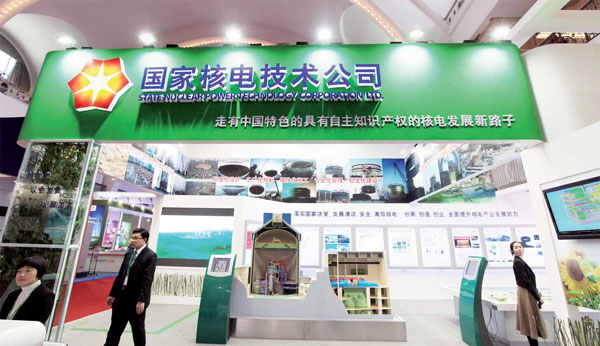Nuclear contract lures Chinese firms
|
South Africa is a potential new market for Chinese nuclear companies like State Nuclear Power Technology Corp. Provided to China Daily |
Government sees huge potential not just for alternative energy source but also for export industry
China's nuclear companies are promoting their technology in South Africa, which is set to offer the largest tender in the country's history, an estimated 1 trillion rand ($93 billion) contract to build six new reactors by 2030.
South Africa is a potential new market for Chinese nuclear companies, including State Nuclear Power Technology Corp and China General Nuclear Power Corp.
"We have been planning this for years," says an employee of the State Nuclear Power Technology Corp in Beijing, who did not want to be identified.
"If we lose this golden opportunity to export our reactors there this time, we will have to wait another 50 to 60 years."
Nuclear energy always involves governments, and China and Africa are looking at agreements covering the supply of nuclear energy products, infrastructure funding, supplier development and localization, as well as skills development, the Ministry of Commerce says.
Last month, the Nuclear Energy Corp of South Africa signed a skills development and training agreement with State Nuclear Power Technology Corp and another Chinese state nuclear energy corporation, China General Nuclear Power Corp, in Johannesburg.
The agreement will create opportunities for young South Africans to further their studies in nuclear energy and other specialized areas of energy at Chinese universities, with funding of up to 95 percent from Chinese institutions.
Wang Binghua, president of State Nuclear Power Technology, which formed a joint venture with Westinghouse Electric Co, the US nuclear group owned by Toshiba of Japan, to help sell Westinghouse nuclear reactors globally, said it was a key step toward nuclear power cooperation between China and South Africa.
China has intellectual property rights for the third-generation nuclear power technology known as CAP1400, based on technology used in the AP 1000 reactor technology of Westinghouse, which means that China is able to export its own reactors, he says.
"It is very important for China because, by achieving our own nuclear technology, it could become a strong nuclear power country and establish itself worldwide."
At the same time, bidders from countries such as Canada, France, South Korea and the US are looking for a piece of the action, as are construction companies and equipment makers than can fulfil a deal of such magnitude.
But China's nuclear industry has an advantage in winning the bid.
When Premier Li Keqiang met the media at the end of the annual session of the national legislature on March 13, he said that for countries wanting to build high-speed rail and nuclear power plants, China can supply construction equipment more quickly and more cheaply than can other countries.
China's nuclear energy development is a priority for the government not only as an alternative energy source but also as a potential export industry.
Sun Qin, chairman of China National Nuclear Corp, said Chinese companies have built and operated nuclear power plants overseas, which gives them an edge over rivals.
"Nuclear markets in new emerging countries are key targets for China," he said on the sidelines of the National People's Congress that ended on March 13.
In the massive buildup plan for nuclear energy, China General Nuclear Power Corp and another of the country's largest state owned nuclear companies, China National Nuclear Corp, are looking to go public on the Hong Kong stock exchange. The move will open the companies to further scrutiny, at home and abroad, and enable them to gain more capital for their planned nuclear programs.
The state-owned companies are looking at opportunities in more developed markets as well. Earlier reports said China General Nuclear Power Corp and China National Nuclear Corp are buying into the Hinkley Point nuclear power project in Somerset, England.
China operates 17 nuclear reactors at home and is building a further 38. The World Nuclear Association says 150 nuclear reactors are being built or are on the drawing board in China, more than one-third of the 435 nuclear reactors that now operate commercially worldwide.
lvchang@chinadaily.com.cn



















